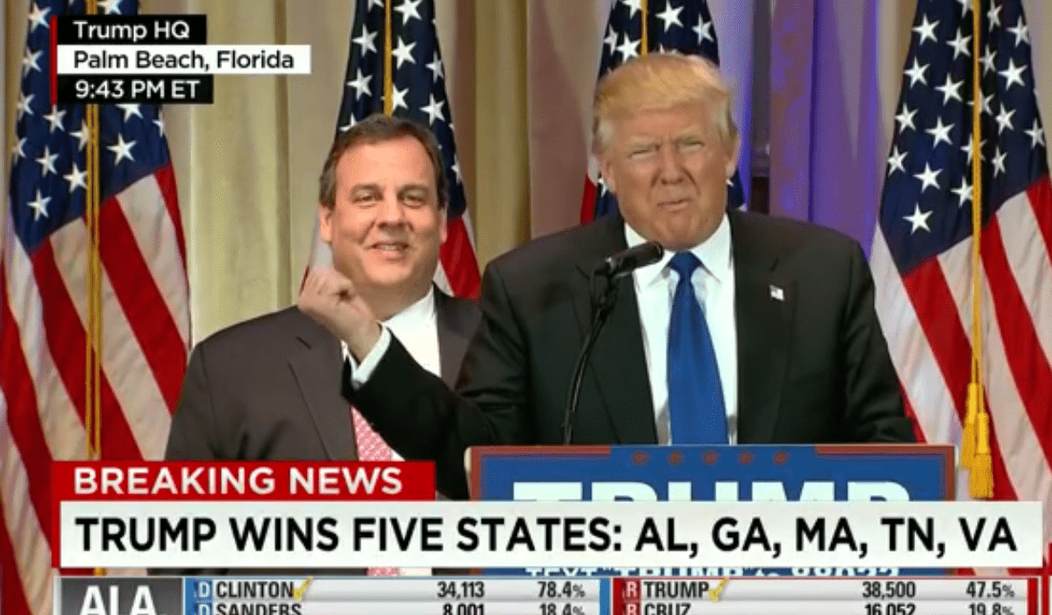News reports are now celebrating Republican frontrunner Donald Trump’s alleged demise, citing horrible poll numbers in general election match-ups and the real estate tycoon’s widespread unpopularity. The real question, however, is not why Trump is unpopular, but why the media and the public ever thought he was popular to begin with.
According to the RealClearPolitics polling average, more people have had an unfavorable opinion of Trump than a favorable one, and by large numbers. His highest ratings are from September, when only 53 percent disliked him (remember those days?), while 39 percent viewed him favorably — a negative 14 point score. His lowest score came last May, when 69 percent disliked him, while only 20 percent liked him, for a whopping negative 49 points. Since then, media coverage may have artificially inflated his numbers.
Nevertheless, over the past month, Trump has hardly fared any better, with 63 percent disliking him and only 30 percent liking him, a score of negative 33.
Why Did Anyone Think He Was Ever Popular To Begin With?
Nate Silver, in a recent FiveThirtyEight analysis, explains “How Trump Hacked the Media.” Looking more closely at the news stories which dominated coverage of the tycoon, Silver discovered three major types of stories: polling (reports of Trump’s high poll numbers from astonished reporters), Trump verses the Republican Party (tales of The Donald beating the “establishment”), and the real estate tycoon’s inflammatory comments (Trump said THIS. Surely, his campaign is over, et cetera, et cetera).
The New York Times has estimated that this coverage has been worth $1.9 billion (that’s BILLION, with a B). This sort of coverage gave Trump a uniquely favorable climate among Republican voters, as an accident of the way it was portrayed.
Reports of Trump’s inflammatory comments, especially early on, were presented as likely damning his candidacy, yet each successive poll showed Trump with a slightly larger sliver of voters than other candidates. Many of these reports also emphasized that Trump was seen as the most electable candidate, but few focused on the real estate tycoon’s low approval ratings among the general public.
Even in October, Trump was viewed negatively by 57 percent of general voters, the highest negative rating of any candidate. Bush, who suffered from his brother’s controversial presidency (which itself ended with low approval ratings), came second, with 48 percent of general voters looking upon him unfavorably. Even in their own party, Trump and Bush had the highest negative ratings, with 37 percent of Republicans looking down upon Bush and 36 percent disliking Trump.
This was not the headline, but buried deep inside the report. Amid all the articles about Trump’s strong polls, his controversial comments which never seemed to derail his campaign, and his battle with the Republican “establishment,” average people got the impression Trump was a big deal, and Republicans fed up with the media and with their party’s elites started to see him as a hero of sorts.
Indeed, distrust of the media also propelled Trump forward. An average Republican would see angry stories about Trump, coupled with reports of his high poll numbers and articles with “seen as the most electable” in the headline. The skeptical conservative would therefore understand: 1- Trump is doing well, according to the data. 2- The media hates Trump, but that’s all just opinion. 3- That very hatred shows that Trump is doing something right.
Even Before the Media Coverage, Trump Had an Advantage
Is it really so surprising, however, that Donald Trump — former star of a reality TV show, former owner of the Miss USA and Miss Universe pageants, and a man who plasters his name across buildings in New York City and Las Vegas — would lead early polls, when most of the other candidates were unknown? Trump’s near universal name recognition gave him an important leg up, and the media’s surprise to see him in the lead further cemented that position.
This is not to say Trump did not win voters over — he clearly did. But the way in which he did so is remarkable, because he has always been a terrible general election candidate, and he does not have a particularly conservative track record. Indeed, he seems to have become the “perfect storm” candidate, playing all his cards right to avoid the usual vetting a party does when choosing its presidential nominee.
The party’s job in primaries is to make sure that their candidates represent the party, and can win a general election. Trump, the man who has flip-flopped on at least ten major conservative issues (he was even for Hillary Clinton in 2012 before he was against her), is unlikely to represent conservative voters well, as National Review never ceases to remind us. But he is also unlikely to win a general election, as many outlets have finally decided to start reporting.
These numbers may not be as damning as they seem. After all, Ronald Reagan lagged far behind President Jimmy Carter in March 1980 match-ups. Nevertheless, it seems the Republican Party could do better than Mr. Trump.
Now that the race has narrowed to two candidates (ok, John Kasich is… in the race… still… kind of), that vetting process seems, belatedly, to have begun. Non-candidate groups like the Club for Growth and Our Principles PAC have really started to hit The Donald, and even former candidates like Scott Walker, Carly Fiorina, and even Lindsey Graham (!!) have started to coalesce behind Ted Cruz as the true conservative alternative.
Bravo, Republican Party. This was only supposed to happen, let’s see, at least nine months ago. For your sake, and America’s, let’s hope it’s not too late.









Join the conversation as a VIP Member